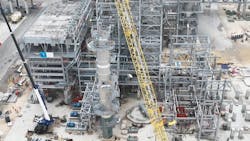Valero confirms completion of Port Arthur SAF project
Valero Energy Corp., San Antonio, Tex., has reached mechanical completion on a large-scale sustainable aviation fuel (SAF) project at its Diamond Green Diesel Holdings LLC (DGD) joint-venture’s (JV) 470-million gal/year renewable diesel plant in Port Arthur, Tex.
DGD—a 50-50 JV of Valero and Darling Ingredients Inc.—completed the project under budget and on schedule earlier this month, Valero said in its third-quarter 2024 earnings report on Oct. 24.
Scheduled to be fully operational by yearend, the SAF project will provide DGD’s plant—which is co-located at Valero’s 385,000-b/d Port Arthur refinery—optionality to upgrade up to 50% of its current 470-million gal/year renewable diesel capacity to SAF production, according to the operator.
DGD’s Port Arthur plant, which reached full production in late 2022, is additionally equipped to produce 20 million gal/year of renewable naphtha (OGJ Online, Jan. 26, 2023).
Sustainable aviation fuel project details
In its latest presentation to investors released in May 2024, Valero said the estimated $315-million project—which will yield a potential 235-million gal/year of SAF—involved installation of a heater, a fractionation unit for separating SAF and renewable diesel streams, and additional product tankage.
In a description of the SAF project in its 2024 Notice of Annual Meeting of Stockholders published in March 2024, Valero indicated DGD would produce synthetic paraffinic kerosene (SPK), a renewable blending component, using the hydrotreated esters and fatty acids (HEFA) process.
Under current aviation regulations, SPK—commonly referred to as SAF or neat SAF—can be blended up to 50% with conventional jet fuel for use in an aircraft in a blend commonly referred to as SAF or blended SAF, the operator said.
Valero also said it was independently evaluating an ethanol-to-jet process that, if adopted, would enable the operator to convert production from a selection of its own low-carbon ethanol plants (e.g., those equipped with carbon sequestration capability) into SAF.
About the Author
Robert Brelsford
Downstream Editor
Robert Brelsford joined Oil & Gas Journal in October 2013 as downstream technology editor after 8 years as a crude oil price and news reporter on spot crude transactions at the US Gulf Coast, West Coast, Canadian, and Latin American markets. He holds a BA (2000) in English from Rice University and an MS (2003) in education and social policy from Northwestern University.

